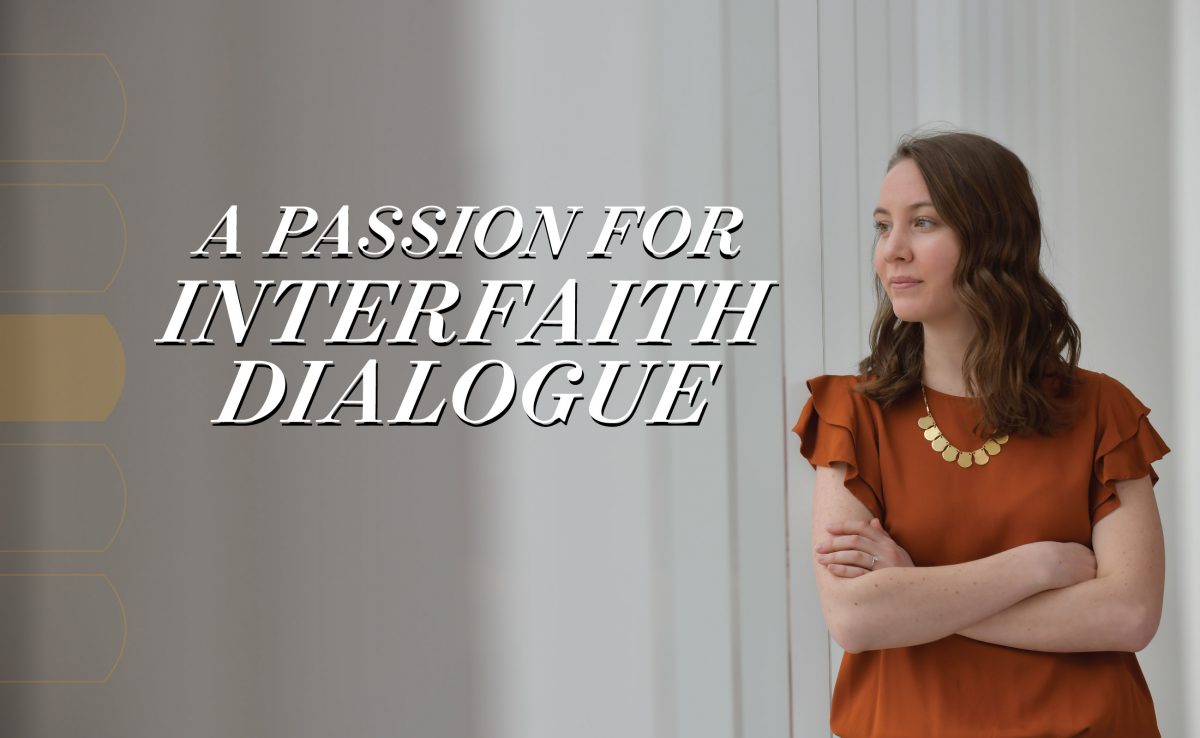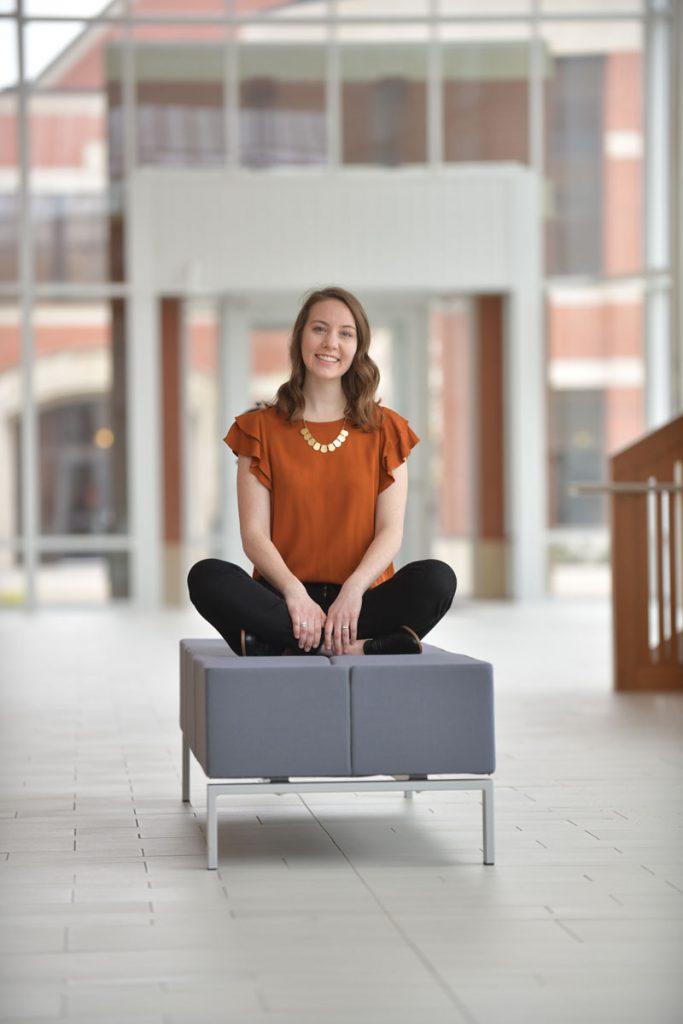A Passion for Interfaith Dialogue
Allison LoPrete ’19 opens with a greeting given by the risen Christ himself:
“Peace be with you.”
It’s the opening of a liturgy that one might expect to find in Sunday morning worship services around the world — or perhaps in Hope’s own Dimnent Memorial Chapel four times a week.
“And also with you,”
the gathered guests predictably reply.
LoPrete pumps her fist: “Yes! I was hoping that would happen.”
She had been leaning forward past the microphone, eyes and smile wide in anticipation, more curious than nervous. There’s a smattering of laughter, led by LoPrete herself. Maybe this isn’t a church service, after all.
The next speaker, Tuba Jaherun, a student from Calvin University (formerly Calvin College), opens her address with a similar greeting:
“As-salamu alaikum.”
Peace be upon you.
From the guests, again as expected:
“Wa alaikum as-salam.”
And peace be upon you, too.
We’re definitely not in Dimnent anymore.
No, this is the Abrahamic Dinner, presented annually by the Grand Valley State University’s Kaufman Interfaith Institute, and held in February 2019 at St. Nicholas Orthodox Church.
LoPrete, who is Christian, and Jaherun, who is Muslim, were invited with Allison Egrin, a Jewish student from Grand Valley, to speak as part of the theme, “Listening to New Voices: The Next Generation Speaks.”
For LoPrete, the invitation to speak was both an honor and a natural extension of her years at Hope working and advocating for interfaith understanding and relationships. It’s an interest that she brought with her to college, that she honed during her tenure at Hope, and that ushered her into a post-college career as a multifaith coordinator for Elon University’s Truitt Center for Religious and Spiritual Life in Elon, North Carolina.
LoPrete is confident and quick to laugh, and although she recognizes that her interfaith work might be, as she puts it, “controversial” to some, she certainly doesn’t look for controversy. Instead, her interfaith interest comes from a frank and compassionate desire to be inclusive, to make sure people aren’t kept on the outside.
In her freshman year, she helped start the Hope Interfaith Youth Alliance while she was living in Scott Hall as a Phelps Scholar. And she traveled later that year to the Pine Ridge Native American reservation in South Dakota for a May Term with Dr. Steven Hoogerwerf ’77, associate professor of religion.
“I was so impressed with her that I encouraged her to go to Pine Ridge with me,” Hoogerwerf said. “I had almost never taken a freshman, but she was passionately interested in the subject and could already talk about it in a way that the average freshman couldn’t.”
From 2018 to 2019, LoPrete served as a Kruizenga Interfaith Ambassador to Hope College. The ambassador program is part of the Kaufman Institute’s work to promote interfaith programming at local colleges, and LoPrete jumped into the role with fervor, bringing Hope students to trainings and programs like the Made in Michigan Interfaith Lab, which she helped organize, and working with the Admissions Office to develop material that helps representatives and tour guides better work with non-Christian prospective students.
“Holy envy is the ability to witness practices in other religions and feel drawn to emulate, push or alter your own faith or spiritual practice.”
In her junior year, she spent a semester at the Al Amana Centre in Oman. The Reformed Church in America started working in Oman in 1892, so Al Amana boasts more than 125 years of, as its slogan puts it, “building trust and peace” among Christians and Muslims.
While at Al Amana, she said, “I learned that I can learn from other faiths and that they can supplement my own faith.” LoPrete calls this “holy envy,” and it was the topic of her address at the Abrahamic Dinner.
“Holy envy is the ability to witness practices in other religions and feel drawn to emulate, push or alter your own faith or spiritual practice,” she explained. “A good example of that is, Muslims pray five times a day; I don’t pray five times a day even if I’m thinking about it. So I have a little bit of holy envy for that ability to focus on conversation with God so pointedly.”
For other examples, LoPrete pointed to the meaningfulness of Shabat in the Jewish tradition, which is more robust than her experience of the Christian Sabbath, and to the Buddhist understanding of the ego. “Or even, what can you take from someone who is atheist?” she asked. “What can you take from their conviction of still having a moral foundation despite not having religion? I feel like that’s harder.”
Also difficult is learning from, and building meaningful relationships with, people who have different understandings of a shared faith tradition — the distinction between intrafaith and interfaith. “Intrafaith can be challenging, sometimes, because you’re arguing about the same religion, but you have such vastly different beliefs.”
LoPrete said that the most frustrating conversations she had at Al Amana weren’t with Muslims but with “other Christians who had a different theology than mine. I felt like their mindset was uncomfortable for me — not because I don’t have some conservative values, because I do, but because I felt there wasn’t room for diversity and inclusion, or for questioning and pushing understanding of scripture.”
She realizes that some people interpret interfaith dialogue as a race away from orthodoxy toward middling noncommitment, but LoPrete insists that interfaith work does not require Christians to water down their faith. On the contrary, she said, “you should be convicted in your beliefs if you’re going to do interfaith work.”
“The Spirit is so much stronger than you think. You can share your experience with Christ authentically and allow the Spirit to do the work. We are not the changer of hearts, that’s God.”
“Any interfaith conversation or dialogue demands that you also share your beliefs — or nonbelief if you’re non-religious. My Christian values are crucial to be able to dialogue with a Muslim, to be able to dialogue with a Hindu,” she said. “You need to understand how you practice your faith and what your theology is in order to share that with someone else. It’s hard to dialogue with someone who’s different if you don’t know who you are.”
Hoogerwerf has been impressed with LoPrete’s ability to blend commitment to her own faith with respect for others’ traditions. “I admire students who are able to have firm convictions but also be interested in and open to other ways of thinking, and she does that really well,” he said.
“It’s a core belief in the Christian faith that you should share your faith and share the grace of Christ, so it’s hard in interfaith spaces to feel like you can’t do that,” LoPrete said. “My response is always, ‘The Spirit is so much stronger than you think.’ You can share your experience with Christ authentically and allow the Spirit to do the work. We are not the changer of hearts, that’s God.”
That realization — that only God is capable of changing a person’s heart —can free Christians to welcome the other from a place of confidence and certainty as well as hospitality and inclusion. And it’s a conviction that fits comfortably with Hope’s Christian Aspirations, which identify the college’s desire to be both faithfully committed to historic Christianity and welcoming to “students of all faiths — or no faith at all.”
“Hope is unapologetically Christian and that’s great. I think that’s important,” LoPrete said. “But are there ways that Hope as a whole can reach out to groups who are of a different religious affiliation and welcome them better?”


